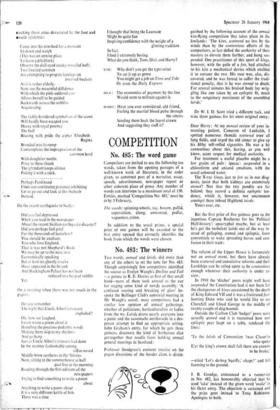No. 483: The winners
Two words, annual and lairds, did more than any of the others to set the tone for No. 483. Though surprisingly few competitors identified the source as Evelyn Waugh's Decline and Fall —a guinea to R. E. Davies as first of that small band—most of them took annual as the cue for staging some kind of rowdy assembly. 'A confused roaring and breaking of glass' be- spoke the Bollinger Club's convivial meeting in Mr Waugh's novel; most competitors had a similar low opinion of annual gatherings, whether of politicians, horticulturalists or ladies from the mil. Lairds drove nearly everyone into a panic and the sassenachs northwards in a des- perate attempt to find an appropriate setting. John Graham's entry, for which he gets three guineas, discovers the kind of barbarous clan get-together that resulis from holding annual general meetings in Scotland : Professor Snodgrass's eminent treatise on the pagan diversions of the border clans is distin-
guished by the following account of the annual kite-flying competition that takes place in the lowlands : The kites, scattered no less by the winds than by the contentious efforts of the competitors, at last defied the authority of their masters to elevate them further, and hung sus- pended. One practitioner of this sport of kings, however, with the guile of a fox, had attached to his kite a mechanical device which enabled it to outsoar the rest. His ruse was, alas, dis- covered, and he was forced to suffer the tradi- tional penalty, that is he was stoned to death. For several minutes his bruised body lay wrig- gling like one taken by an epileptic fit, much to the sanguinary merriment of the assembled lairds.'
Dr W. I. D. Scott tried a different tack, and wins three guineas for his most original entry:
Dear Harry : At my annual review- of your in- teresting patient, Cameron of Lochalsh, I spotted numerous rhonchi scattered over all lung fields, and urged the old sinner to give up his filthy self-rolled cigarettes. He was a bit contentious about this, having, as you well know, scant respect for medical authority.
For treatment a useful placebo might be a few grains of pulv : ipecac : suspended in a chloroform and aniseed emulsion, with the usual coloured water.
The X-ray kings, just to fox us in our diag- nosis, insist that both kidneys are extensively stoned! Not that the EEG pundits are far behind; they record a definite epileptic ten- dency, which is, however, not uncommon amongst these inbred Highland lairds.
Yours ever, etc.
But the first prize of five guineas goes to the ingenious Captain Rochester for his 'Political Half-history'; apocryphal maybe, but at least he's got the turbulent lairds out of the way in- stead of galloping, stoned and epileptic, from conventicle to wake spreading havoc and con- fusion in their train: The reform of the Upper House is fortunately not an annual event, but there have already been scattered and cumulative reforms and their Lordships can be relied upon to be contentious enough whenever their authority is under re- view.
In 1910 the 'ditcher' peers might well have suspended the Constitution had it not been for the changeover of kings occasioned by the death of King Edward VII and it was a frustrated fox- hunting Duke who said he would like to see Churchill and Lloyd George in the middle of twenty couple of dog-hounds.
Outside the Carlton Club `hedger' peers were actually stoned and it is recounted how one epileptic peer leapt on a table, rendered the lines: `To the lairds of Convention 'twas Claver'se who spoke E'er the king's crown shall fall there are crowns to be broke,' —cried `Let's de-bag Squiffy,' chaps!' and fell foaming to the ground.
J. B. Goudge, announced as a runner-up in No. 482, hat honourably objected that he used 'take' instead of the given word 'make' in his Octet entry. The objection is sustained and the prize goes instead to Tony Robinson. Apologies to both.


































 Previous page
Previous page